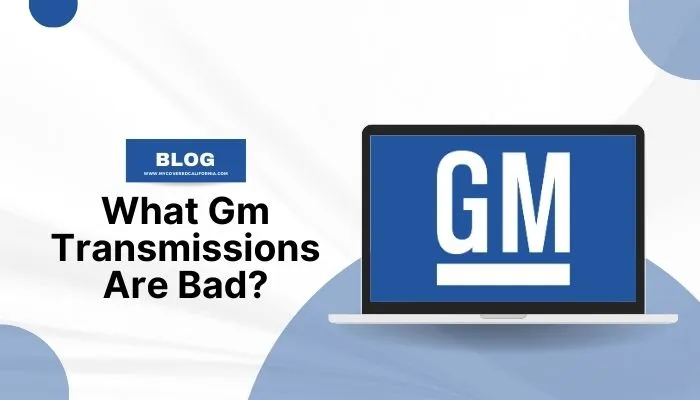What GM Transmissions Are Bad? In the automotive world, the efficiency and reliability of transmissions play a pivotal role in the overall performance of vehicles.
GM transmissions have a prominent presence on the road, making it essential for car owners and enthusiasts to delve into the intricacies of these components.
Identifying problematic transmissions is crucial for maintaining a vehicle’s longevity and optimal performance. A malfunctioning transmission can lead to a cascade of issues affecting the engine and overall driving experience.
This article focuses on an in-depth exploration of GM transmissions, shedding light on common issues, identifying models prone to problems, and offering insights into preventive measures.

What GM Transmissions Are Bad?
GM transmissions serve as the critical link between the engine and wheels, enabling the smooth transfer of power and facilitating seamless gear changes. Understanding their role is fundamental to grasping their significance.
- GM boasts a diverse range of transmissions, each tailored to specific vehicle models. Automatic, manual, and CVT (Continuously Variable Transmission) are among the common types, each with its unique characteristics.
- The natural aging process and regular usage contribute to wear and tear on transmission components. Regular inspections and maintenance can mitigate the impact of this inevitable factor.
- Adopting proactive maintenance practices, such as fluid changes and inspections, is pivotal in preserving the health of GM transmissions. Neglecting routine care can lead to costly repairs.
Aggressive driving, frequent towing, and abrupt acceleration contribute to increased stress on transmissions. Understanding how driving habits impact transmission longevity is essential for responsible vehicle ownership.
Identifying Problematic GM Transmissions
Here are problematic GM transmissions:
1. Unusual Sounds
Strange noises, such as whining or clunking, may indicate internal transmission problems. Recognizing these auditory cues is vital for early intervention.
2. Delayed or Rough Shifting
Problems with shifting, such as delays or rough transitions between gears, often signal transmission issues. Monitoring and addressing these symptoms promptly can prevent further damage.
3. Fluid Leaks
Transmission fluid leaks are red flags that should not be ignored. Identifying the source and addressing leaks promptly is crucial for preventing extensive damage.
4. Warning Lights
Modern vehicles are equipped with sophisticated diagnostic systems that trigger warning lights when issues arise. Understanding these indicators and seeking professional assistance is paramount.
Common Models Prone to Transmission Problems
Exploring the historical context of problematic transmissions provides valuable insights into recurring issues across various GM models.
Certain GM models may exhibit specific weaknesses in their transmission systems. Understanding these vulnerabilities empowers car owners to take proactive measures.
GM Transmissions with Known Issues
Highlighting specific GM models notorious for transmission problems provides a comprehensive overview for prospective buyers and current owners.
Identifying patterns of recurring problems across different models sheds light on potential design or manufacturing issues within GM transmissions.
Model A – Common Issues and Solutions
A deep dive into the common issues of Model A, coupled with effective solutions, provides practical insights for owners facing transmission challenges.
Model B – Addressing Transmission Challenges
Exploring the unique challenges of Model B’s transmission system and recommending effective solutions contributes to a holistic understanding for the reader.
Model C – Notable Weaknesses and Repairs
Analyzing the weaknesses of Model C’s transmission system and outlining recommended repairs equips car owners with the knowledge needed for proactive maintenance.
Impact on Vehicle: What GM Transmissions Are Bad?
A compromised transmission negatively affects fuel efficiency, leading to increased operating costs. Understanding this impact underscores the importance of timely interventions.
Ignoring initial signs of transmission issues can escalate problems, eventually leading to complete transmission failure. The associated costs and inconveniences highlight the need for preventative measures.
Transmission problems can compromise vehicle safety, especially in critical situations. Addressing these concerns promptly ensures the overall safety of the driver and passengers.
Cost Implications of Transmission Repairs
Understanding the average costs associated with transmission repairs provides car owners with financial foresight, enabling better budgeting and decision-making.
Emphasizing the financial benefits of timely maintenance serves as a compelling incentive for car owners to prioritize routine care over costly repairs.
Strategies for Prevention and Maintenance
Regularly checking and replacing transmission fluid is a fundamental aspect of maintenance, ensuring optimal lubrication and cooling.
Periodic professional inspections by certified mechanics can identify potential issues early on, preventing major breakdowns and extending the lifespan of the transmission.
Driving Practices to Preserve Transmission Health
Encouraging responsible driving habits, such as avoiding abrupt acceleration and deceleration, minimizes stress on the transmission and promotes longevity.
Allowing the vehicle to warm up adequately before driving in cold conditions prevents unnecessary strain on the transmission components.
Addressing GM Transmission Issues
Providing car owners with basic troubleshooting steps empowers them to address minor transmission issues independently, promoting self-sufficiency.
Detailing common DIY fixes for specific transmission problems equips readers with practical solutions that can be implemented without professional assistance.
Seeking Professional Assistance
Highlighting the expertise of certified mechanics in diagnosing and repairing transmission issues reinforces the value of professional assistance.
Exploring the options of transmission rebuilding and replacement helps car owners make informed decisions based on the severity of the transmission problems.
Conclusion
In conclusion, “What GM Transmissions Are Bad?” Summarizing the key points discussed throughout the article reinforces the critical aspects of identifying and addressing problematic GM transmissions.
Reiterating the importance of recognizing and addressing transmission issues emphasizes the role of proactive maintenance in ensuring a vehicle’s longevity and performance.
Concluding with a call to action for responsible ownership and proactive maintenance reinforces the overarching theme of prioritizing the health and longevity of GM transmissions.

Hello there, I’m Loretta Flores, your go-to Customer Support Specialist for the GM-Socrates platform. Leveraging my 3 years of experience, I am here to work together to streamline your processes and maximize efficiency.